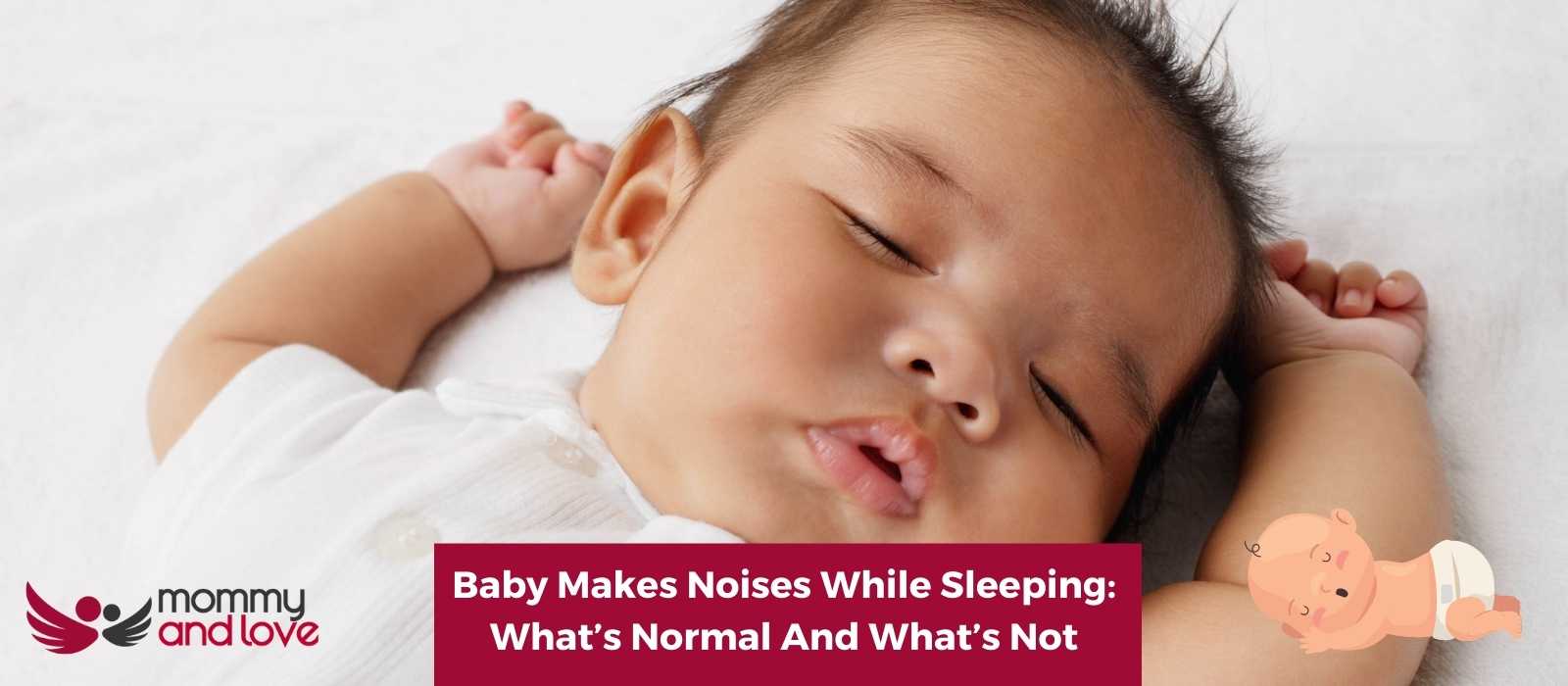Do you ever wonder what’s normal when it comes to babies making noises while sleeping? You’re not alone! Many parents are curious about this topic.
A baby’s sleep can be noisy and full of movement. Many babies wake up easily, move and jolt around while they sleep, flail their arms and legs, make sucking sounds, and whimper when they want to feed. And these are all normal things.
The Basics of Newborn Sleep
As a new parent, you may be wondering what to expect when it comes to your newborn’s sleep patterns. Here are four things to keep in mind when your babies sleep:
1) Hungry babies root while they sleep.
Newborns tend to root and search for food while they sleep. This is because they have tiny tummies and need to eat frequently.
2) Newborns have lots of sleep transitions.
Newborns have lots of sleep transitions. They may go from deep sleep to light sleep several times throughout the night.
3) REM Sleep is more active.
REM (rapid eye movement) sleep is more active for newborns. You may notice your baby’s eyes moving quickly under their eyelids during this phase of sleep. Additionally, most babies spend most of their sleep time in active sleep and several dream phases.
As your baby matures, they will have fewer REM cycles and will have more periods of quieter sleep.
4) Newborn sleep is restless.
Newborn sleep is often restless and their sleep cycles are wonky. These are what make babies restless sleepers. When babies sleep, they may move around a lot, make noises, and even startle themselves awake.
Don’t worry if your newborn’s sleep patterns seem strange to you at first. Just remember that they’re normal for newborns and they’ll eventually start sleeping through the night. In the meantime, enjoy those precious moments of watching your baby sleep!
What Are Normal Baby Sleep Sounds?

Most babies will make small sounds while they sleep. These baby sleep sounds are usually soft and low and may include regular breathing, cooing, or even light snoring.
Older children can sleep for hours without getting up, but young babies squirm, move around and wake up a lot.
While these typical newborn sleep sounds can be soothing to parents, it’s important to know that they’re also normal.
Regular Breathing Sounds
It’s fine if your baby’s normal breathing sounds are short and sweet, almost like soft panting. You might also hear a few dreamy sighs. Other regular breathing sounds include:
Gurgling Noises
Gurgling sounds are produced as your baby breathes and when air moves through even the slightest bit of saliva or milk that has come back up. During sleep, these sounds are likely to build up. Slowly, the baby gets better at swallowing. Moreover, your baby’s airway and nasal passages are tiny.
Grunt and Groan
When your kid grunts or groans while sleeping, it usually indicates that they’re becoming used to having bowel movements. Babies are just starting out and are still getting used to using their stomach muscles to move poop and gas through their bodies.
Lip Smacking
It’s normal for your baby to smack his or her lips when he or she is sleeping. This could mean they are trying to calm themselves down during a sleep cycle, having a dream about eating or are getting hungry.
Whistling
A baby has a tiny nose. And when newborn babies breathe out of their noses, the resulting noise is a whistling sound. This allows them to breathe and eat simultaneously. Additionally, the whistling sound can be caused by your newborn’s narrow nasal passage.
Irregular Breathing
A baby’s breathing is usually irregular, so this means babies tend to go from fast to slow and stop every once in a while. You might hear short pauses for brief periods followed by gasps and gulps of air. If your baby makes sounds when he or she breathes, write them down or record them for the next time you go to the doctor.
Periodic Breathing
There may even be a few seconds when it seems like your baby isn’t breathing at all. This periodic pattern of breathing is a normal part of how a baby grows and develops. Your child should outgrow this as they get older.
Laryngomalacia
Laryngomalacia is a condition in which the larynx (voice box) tissues above the vocal cords are soft from birth. The larynx is misshapen and floppy, which makes the tissues fall over the opening of the airway and partially block it. This is the most common cause of noisy breathing in babies and can sound like squealing. If your baby is squealing in sleep then read our guide.
Transient Rapid Breathing
Transient rapid breathing, also called transient tachypnea of the newborn (TTN), happens when the baby’s lungs take longer to absorb the fluid after birth. The disorder is often seen in babies who were delivered via cesarean section.
This condition usually lasts less than 24 hours, which is what “transient” means, and “tachypnea” means fast breathing.
Respiratory Sounds
Respiratory sounds are common in young babies and usually nothing to worry about. However, if your baby is making grunting noises with each breath, this could be a sign of respiratory distress and you should seek medical attention immediately.
Digestive Sounds
Digestive sounds are also normal especially during frequent feedings because your baby’s respiratory and digestive systems. But can sometimes be a cause for concern. If your baby is making loud wheezing sounds, it could be a sign of gastroesophageal reflux disease (GERD).
If your baby is excessively spitting up or vomiting, this could also be a sign of GERD. If you’re concerned about any of these sounds your baby is making, it’s always best to consult with your pediatrician.
Other Noises and Sounds
Other weird noises and sounds can sometimes be cause for concern, but not always. If your baby is making clicking noises while breathing, this could be a sign of congenital heart disease.
What Baby Noises Should I Worry About?

When you’re a new parent, it’s totally normal to worry about baby sleep noises your little one makes. But in most cases, there’s no need to worry about your baby’s coos and gurgles.
Baby cooing is usually a sign that they’re content and happy.
However, if you notice that your little one is making a lot of baby sleep noises, especially high-pitched cries, it could be a sign that they’re in pain or uncomfortable.
Additionally, persistent grunting, difficulty breathing and rapid breathing of more than 60 breaths a minute are indications of respiratory distress.
You should contact your doctor immediately or take them to the nearest emergency room. If you’re not sure what to do, always err on the side of caution and call 911.
How Long Are Babies Noisy Sleepers?
Most babies are noisy sleepers until they’re around six months old when they spend less time in active sleep. That’s when they start to develop the ability to sleep through the night and your baby’s sleep noises occur less and less.
However, some babies may continue to be noisy sleepers until they’re a year old or even older. If your baby is a noisy sleeper, don’t worry – it’s normal to hear sleep noises.
Why Do Newborn Babies Grunt and Squirm While Sleeping?

A newborn grunting in his sleep is perfectly normal. When your baby grunts or squirms, it is usually caused by digestion. Your baby is just getting used to breastmilk or formula. This can cause gas and bloating, which may make your baby uncomfortable.
The good news is that this phase doesn’t last long. Within a few weeks, your baby will be able to digest milk more easily and will be less likely to grunt and squirm while sleeping.
You can get your baby back to sleep by making sure his room is comfortably warm. You can also dim the lights and put on white noise.
So, the next time you hear your baby grunting, don’t worry.
What Does It Mean When Baby Coos?

It’s a question that many new parents ask, and it’s one that doesn’t have a simple answer. Baby cooing is a way of finding their voice, and it’s something that all babies do at some point.
It’s a milestone in their development, and it’s one that you’ll want to watch for.
There are a few things that you can look for when it comes to cooing. First, they’ll start making small sounds, often when they’re alone or content. These sounds will be soft and gentle, and they’ll usually be made in a repetitive way. As they get more comfortable with their voice, your baby’s sounds and breathing patterns might be different.
Baby cooing is a normal part of development, and it’s something that all babies do at some point. Remember, every baby is different, so don’t worry if your baby isn’t cooing as early as some of their peers. Just enjoy this special time and watch your baby grow.
When Should I Put My Baby on a Sleep Schedule and Establish a Routine?
It’s generally recommended that you start working on a sleep schedule and routine for your baby when they are about two months old. At this age, babies have usually settled into somewhat of a pattern of sleeping and waking.
Of course, every baby is different and some may be ready to start sleep training earlier or later than two months. The sooner your baby learns how to sleep independently, the better.
Conversely, if you feel like your baby isn’t quite ready to start sleep training at two months old, you can wait a bit longer. Just keep in mind that the earlier you start sleep training, the easier it will be. So if you’re on the fence, it’s usually best to err on the side of starting sooner rather than later.
Most importantly, follow safe sleep guidelines to let your baby develop healthy sleeping habits.
Conclusion
Have you ever been worried about your baby’s sleep sounds? Maybe you heard a weird noise and thought something was wrong. Don’t worry, the vast majority of baby sleep sounds are completely normal. Keep in mind that babies are still getting better at controlling how their digestive and respiratory systems work.
In fact, many of these baby sleep sounds are caused by your little one breathing deeply and evenly. So the next time you hear your baby snoring away in their crib, relax and know that everything is just fine.




